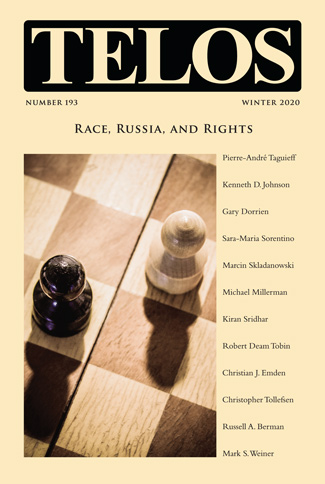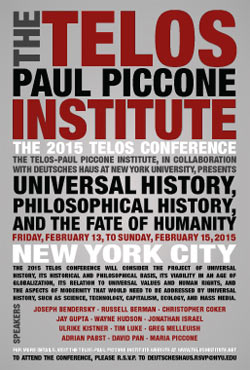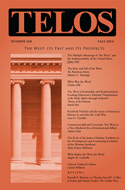By David Pan · Monday, July 18, 2022  The extended nature of the war in Ukraine stems from the long-term political and ideological developments that have led up to it and will continue to dominate it. In Russia, the government has maintained support for the war through the promotion of a civilizational narrative about Russian culture that has been established over the last twenty years. As Marcin Skladanowski describes in “Criticism of Western Liberal Democracy by Patriarch Kirill of Moscow and All Rus'” (Telos 193), the Russian Orthodox Church has set up the conflict between Russia and the West as a moral one, in which Russia defends a divinely grounded morality against the amoral secularism of the West. This religiously grounded idea of a civilizational conflict exists alongside a philosophical explanation. In “The Ethnosociological and Existential Dimensions of Alexander Dugin’s Populism” (Telos 193), Michael Millerman describes Dugin’s Heideggerian attempt to establish civilizational differences between peoples as the basis for an anthropological theory of human existence. As Nikolai-Klaus von Kreitor recounts in “Elements of the New Russian Nationalism” (Telos 96), Dugin was already at work in the early 1990s on such ideas when he developed Carl Schmitt’s theory of the Grossraum in order to criticize U.S. imperialism and justify a Eurasian regional hegemony to counter the dominance of the Western liberal order. The extended nature of the war in Ukraine stems from the long-term political and ideological developments that have led up to it and will continue to dominate it. In Russia, the government has maintained support for the war through the promotion of a civilizational narrative about Russian culture that has been established over the last twenty years. As Marcin Skladanowski describes in “Criticism of Western Liberal Democracy by Patriarch Kirill of Moscow and All Rus'” (Telos 193), the Russian Orthodox Church has set up the conflict between Russia and the West as a moral one, in which Russia defends a divinely grounded morality against the amoral secularism of the West. This religiously grounded idea of a civilizational conflict exists alongside a philosophical explanation. In “The Ethnosociological and Existential Dimensions of Alexander Dugin’s Populism” (Telos 193), Michael Millerman describes Dugin’s Heideggerian attempt to establish civilizational differences between peoples as the basis for an anthropological theory of human existence. As Nikolai-Klaus von Kreitor recounts in “Elements of the New Russian Nationalism” (Telos 96), Dugin was already at work in the early 1990s on such ideas when he developed Carl Schmitt’s theory of the Grossraum in order to criticize U.S. imperialism and justify a Eurasian regional hegemony to counter the dominance of the Western liberal order.
Continue reading →
By Robert Wyllie · Monday, April 6, 2015  Archaeologists have found the oldest known example of complex intergenerational cooperation at Göbekli Tepe in southern Turkey. Thirty miles away, just across the Syrian border, is the latest flashpoint of a complex intergenerational conflict—what President Obama calls the “barbarism” of the Islamic State.[1] What does the world’s oldest civilization have to do with the world’s newest barbarians? Both show the fundamental role of religion in organizing human societies. Viewing civilization as the product of religion bucks a long academic tradition. A consensus holds that human culture is an adaptive response to the environment. Ecological factors shape the economic base of society, molding civilizations in different ways. Thus, in the “Neolithic Revolution” hypothesis of V. Gordon Childe, civilization originated when the global climate warmed some 12,000 years ago, such that human beings could cultivate grains in fertile river valleys (Mesopotamia, Egypt, India, and China). This was the economic base upon which a civilizational superstructure—hierarchies, regimes, and religion itself—was built. Archaeologists have found the oldest known example of complex intergenerational cooperation at Göbekli Tepe in southern Turkey. Thirty miles away, just across the Syrian border, is the latest flashpoint of a complex intergenerational conflict—what President Obama calls the “barbarism” of the Islamic State.[1] What does the world’s oldest civilization have to do with the world’s newest barbarians? Both show the fundamental role of religion in organizing human societies. Viewing civilization as the product of religion bucks a long academic tradition. A consensus holds that human culture is an adaptive response to the environment. Ecological factors shape the economic base of society, molding civilizations in different ways. Thus, in the “Neolithic Revolution” hypothesis of V. Gordon Childe, civilization originated when the global climate warmed some 12,000 years ago, such that human beings could cultivate grains in fertile river valleys (Mesopotamia, Egypt, India, and China). This was the economic base upon which a civilizational superstructure—hierarchies, regimes, and religion itself—was built.
Continue reading →
By Angelo M. Codevilla · Monday, November 17, 2014 Angelo M. Codevilla’s “What Makes the West the West?” appears in Telos 168 (Fall 2014). Read the full version online at the Telos Online website, or purchase a print copy of the issue in our store.
 The intellectual-moral propositions that make the West the West are particular and exclusive to our civilization. They are indefensible, incomprehensible nonsense except in terms of Jerusalem and Athens. The ideas that distinguish the West’s forma mentis follow from the Biblical teaching that God created the universe by and through logos. This beckons our reason. The charter of human equality and freedom, unique to the West, is the Biblical teaching that man is created in the image and likeness of God. The West’s distinctiveness follows as well from Parmenides of Elea’s distinction between opinions and the truth of “the things that are.” This empowered human reason to access the logos of the universe. Consequently, reason distinguished between positive law—what is right by human will—and what is right by nature—natural law. The intellectual-moral propositions that make the West the West are particular and exclusive to our civilization. They are indefensible, incomprehensible nonsense except in terms of Jerusalem and Athens. The ideas that distinguish the West’s forma mentis follow from the Biblical teaching that God created the universe by and through logos. This beckons our reason. The charter of human equality and freedom, unique to the West, is the Biblical teaching that man is created in the image and likeness of God. The West’s distinctiveness follows as well from Parmenides of Elea’s distinction between opinions and the truth of “the things that are.” This empowered human reason to access the logos of the universe. Consequently, reason distinguished between positive law—what is right by human will—and what is right by nature—natural law.
Continue reading →
|
|
 The extended nature of the war in Ukraine stems from the long-term political and ideological developments that have led up to it and will continue to dominate it. In Russia, the government has maintained support for the war through the promotion of a civilizational narrative about Russian culture that has been established over the last twenty years. As Marcin Skladanowski describes in “Criticism of Western Liberal Democracy by Patriarch Kirill of Moscow and All Rus'” (Telos 193), the Russian Orthodox Church has set up the conflict between Russia and the West as a moral one, in which Russia defends a divinely grounded morality against the amoral secularism of the West. This religiously grounded idea of a civilizational conflict exists alongside a philosophical explanation. In “The Ethnosociological and Existential Dimensions of Alexander Dugin’s Populism” (Telos 193), Michael Millerman describes Dugin’s Heideggerian attempt to establish civilizational differences between peoples as the basis for an anthropological theory of human existence. As Nikolai-Klaus von Kreitor recounts in “Elements of the New Russian Nationalism” (Telos 96), Dugin was already at work in the early 1990s on such ideas when he developed Carl Schmitt’s theory of the Grossraum in order to criticize U.S. imperialism and justify a Eurasian regional hegemony to counter the dominance of the Western liberal order.
The extended nature of the war in Ukraine stems from the long-term political and ideological developments that have led up to it and will continue to dominate it. In Russia, the government has maintained support for the war through the promotion of a civilizational narrative about Russian culture that has been established over the last twenty years. As Marcin Skladanowski describes in “Criticism of Western Liberal Democracy by Patriarch Kirill of Moscow and All Rus'” (Telos 193), the Russian Orthodox Church has set up the conflict between Russia and the West as a moral one, in which Russia defends a divinely grounded morality against the amoral secularism of the West. This religiously grounded idea of a civilizational conflict exists alongside a philosophical explanation. In “The Ethnosociological and Existential Dimensions of Alexander Dugin’s Populism” (Telos 193), Michael Millerman describes Dugin’s Heideggerian attempt to establish civilizational differences between peoples as the basis for an anthropological theory of human existence. As Nikolai-Klaus von Kreitor recounts in “Elements of the New Russian Nationalism” (Telos 96), Dugin was already at work in the early 1990s on such ideas when he developed Carl Schmitt’s theory of the Grossraum in order to criticize U.S. imperialism and justify a Eurasian regional hegemony to counter the dominance of the Western liberal order.  Archaeologists have found the oldest known example of complex intergenerational cooperation at Göbekli Tepe in southern Turkey. Thirty miles away, just across the Syrian border, is the latest flashpoint of a complex intergenerational conflict—what President Obama calls the “barbarism” of the Islamic State.
Archaeologists have found the oldest known example of complex intergenerational cooperation at Göbekli Tepe in southern Turkey. Thirty miles away, just across the Syrian border, is the latest flashpoint of a complex intergenerational conflict—what President Obama calls the “barbarism” of the Islamic State. The intellectual-moral propositions that make the West the West are particular and exclusive to our civilization. They are indefensible, incomprehensible nonsense except in terms of Jerusalem and Athens. The ideas that distinguish the West’s forma mentis follow from the Biblical teaching that God created the universe by and through logos. This beckons our reason. The charter of human equality and freedom, unique to the West, is the Biblical teaching that man is created in the image and likeness of God. The West’s distinctiveness follows as well from Parmenides of Elea’s distinction between opinions and the truth of “the things that are.” This empowered human reason to access the logos of the universe. Consequently, reason distinguished between positive law—what is right by human will—and what is right by nature—natural law.
The intellectual-moral propositions that make the West the West are particular and exclusive to our civilization. They are indefensible, incomprehensible nonsense except in terms of Jerusalem and Athens. The ideas that distinguish the West’s forma mentis follow from the Biblical teaching that God created the universe by and through logos. This beckons our reason. The charter of human equality and freedom, unique to the West, is the Biblical teaching that man is created in the image and likeness of God. The West’s distinctiveness follows as well from Parmenides of Elea’s distinction between opinions and the truth of “the things that are.” This empowered human reason to access the logos of the universe. Consequently, reason distinguished between positive law—what is right by human will—and what is right by nature—natural law. 

